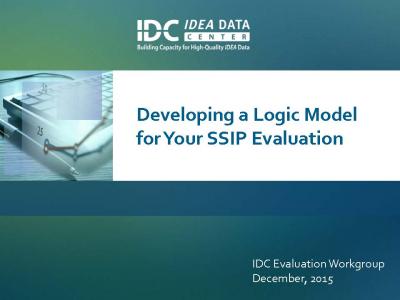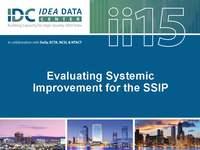Site Search
Results 15 - 21 of 76
Format: Presentations
Collecting and Using Data on Improvement StrategiesInformation focuses on ways to collect and use data on coherent improvement strategies and assess gaps in existing data for evaluation and provides examples of existing data or information states are already collecting (e.g., through monitoring) and how to use that data to measure SSIP activities. A helpful handout is included.
Format: Presentations
Considerations for Making Changes to SIMR Baselines and TargetsThe presentation examines the reasons why states would change baselines or targets for their SSIPs. Topics addressed include changes in assessments, data collection methods, and data quality. Participants discussed and provided input into an IDC white paper on the topic. Currently, the white paper is in draft form and undergoing revisions based on input from the field. The published paper will be posted to the IDC Resource Library and affiliated as a related resource to the handout already posted for this session.
Format: Presentations
Data Quality in the Age of SSIP: Measure Twice. Cut Once.The presentation provides information about what data quality means, how to get to data quality for the SSIP and why data quality is increasingly important.
Format: Presentations
Depth of Engagement: Important New Tools for Reference and Self-ReflectionThe presentation explores four rubrics stakeholders developed that identify levels and depths of engagement of stakeholders.
Format: Presentations
Developing a Logic Model for Your SSIP EvaluationThis presentation focuses on the role that developing a logic model has in overall SSIP evaluation planning.
Format: Presentations
Equity, Inclusion, & Opportunity: Addressing Success GapsThis presentation introduced the audience of local education agency personnel to new tools, the Equity, Inclusion, and Opportunity: How to Address Success Gaps Rubric and the Equity, Inclusion and Opportunity: How to Address Success Gaps White Paper. The rubric and white paper were developed by a group of OSEP-funded technical assistance providers, with input from states and other experts. The Equity, Inclusion, and Opportunity: How to Address Success Gaps tools provide a process for reducing the differences in school success among subgroups of students by providing a structure for districts or schools to examine their current practices and identify areas for improvement.
Format: Presentations
Evaluating Systemic Improvement for the SSIPA critical aspect of the SSIP evaluation is measuring improvements to system infrastructure. The presentation provides information on how states can measure changes to systems for supporting implementation of evidence-based practices.








